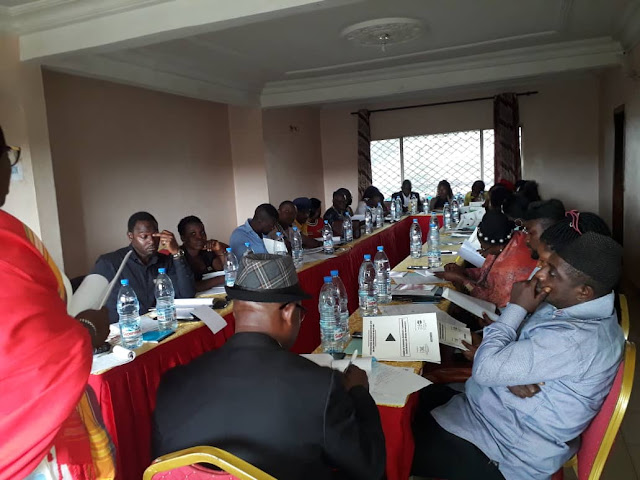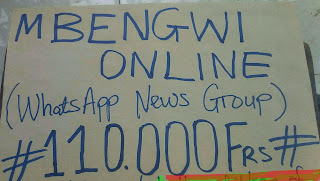As the clock is ticking through out the territorial confines of the beautifully unique Central African country, Cameroon, unarguably described as Africa in miniature, all heads are uniformly turning towards the nation's political capital, Yaounde as the count down to the highly anticipated grand national dialogue tappers down to the D-day, September 30th 2019.
At the tail end of 2016, lawyers and teachers across the two English speaking regions of Cameroon took the government to task, requesting for reforms in the educational and legal systems of the country that will permit them to better practice in the language they master most. Their demands had nothing to do neither with the form of the state nor secession.
Meanwhile proponents of secession had long been nursing ambitions of destabilizing the long reigning peace Cameroon had been priding itself of. For years they'd incessantly been looking for avenues to push through their agenda, reason why when lawyers and teachers later took to the streets during the negotiation sessions with government ministers in Bamenda and Buea that were at times ending in deadlock, these agents wasted no time to hijack the peaceful street matches from the lawyers and teachers and converted them into violent demonstrations involving confrontations with the duty consciousness state forces.
In defending fatherland with honour and fidelity, the military was soon taken aback when before the twinkle of an eye, incited and brainwashed youths had picked up arms, mostly Dane guns and locally fabricated pistols to face them. No nation in the world had ever folded it's arms to watch citizens pick up arms to fight the army. Sooner, fire exchanges ensued and before long a multiplicity of non state armed groups sprouted up across the two English speaking regions. As days went by they too began gaining possession of more sophisticated firearms.
It now became obviously clear that the bird had been dancing on the road because there was a drummer hiding in the bush. At first the secesionist fighters came like Messiah's to repeat Moses' legacy of freeing the Israelites from Egypt to the promised land. They were embraced, loved, cherished and willfully supported. No doubt on September 22nd 2017, hundreds of thousands of Anglophone Cameroonian's took to the streets for a peaceful protest. Some went as far as hoisting flags and nylon papers saying their imaginary country, Ambazonia was now in existence. Images emerged on social media portraying the military accompanying the population to exercise their constitutional and civic right of peacefully demonstrating.
Months went by till date, Ambazonia remained a white elephant dream. The supposed Messiah's gradually metamorphosed into the complete opposite of what they had portrayed. The population itself was taken aback when they started facing the wrath of the fighters, Amba Boys so they call themselves. After successfully installing themselves on the ground, from thence henceforth they began showing their real colours. First they shutdown schools then imposed ghost towns afterwards, weeks of lock down. As if that wasn't enough they started kidnapping wealthy citizens and asking for ransoms worth millions and hundreds of thousands before freeing them. Those who can't comply to their demands are killed or parts of their body chopped off. Anybody that tries to criticise them is termed a black leg and his punishment is death or severe torture.
In all of this, the Head of State never stayed indifferent to the plight of citizens in this part of the nation. He kept sending his ministers to the field to meet the people and ask them what they want. In all the talks, they never mentioned secession. Yet the sessionists kept pushing forth their agenda. It became glaring that abuses on the ground committed by the armed fighters were masterminded from abroad. Multiple fund raising ceremonies were organised by some unscrupulous diaspora Cameroonians who've even picked up foreign nationalities to buy arms and send to the ground fighters. Shockingly, financial squabbles soon started erupting within their ranks as accusations and counter accusations of embezzlement arose. Leadership tussles also erupted as the quest for power became the order of the day. The angel the population thought they had became the real devil they had never wanted to ever have.
On the 8th of September 2019, the Head of State shocked all his detractors who had judged him as a silencer. At 8pm on state media in a 30 minutes well loaded speech, he announced the convening of a Grand National Dialogue to discuss not only the anglophone crisis but other concerns plaguing the entire nation. The big bag announcement was received with immeasurable euphoria nationwide and beyond. Many began seeing it as the highly sort for light at the end of the tunnel that shall get all and sundry Anglophones out of the ongoing quagmire. In addition to the announcement he fatherly extended a hand of fellowship to leaders of the various armed groups to come to the dialogue table for as it is said, nothing pass arrangenent.
Unfortunately there are still those who've continued to give the dog a bad name in order to hang it. Most of such are those who see an end to the crisis as a termination of the benefits they've been reaping especially through ill gotten money. Despite the good intentions of President Paul Biya, they still carved baseless arguments like there must be s must be a neutral third party, it must take place on a neutral ground, this and that. Unfortunately all has been planned and come Monday September 30th, the big history making event shall be held at the Yaounde conference centre with close to 400 delegates to represent the wishes of the Anglophones










